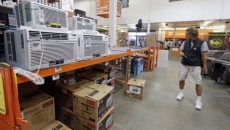Despite what Prime Minister Justin Trudeau has said recently, a new poll suggests 40 per cent of Canadians think his government is to blame for the country's housing crisis.
Leger surveyed 1,537 people between Aug. 18 and 20, asking a series of questions about the rising cost of housing and what should be done about it.
When asked which level of government deserves the most blame for the crisis, 40 per cent of respondents pointed the finger at the federal government and 32 per cent at their provincial government.
Just six per cent of those polled felt their municipal government was to blame and another 22 per cent said they were not sure.
Renters were more likely to blame the province, while those who own their homes were inclined to blame the feds.
Trudeau was criticized by opposition parties and experts after he told reporters earlier this month that "housing isn't a primary federal responsibility," suggesting that the provinces and municipalities should step up.
Even so, this week the Liberal cabinet has been meeting with two experts who published a report on housing that sets out 10 recommendations for how the federal government could tackle the problem.
One of those is a national housing accord that would see all three levels of government agree to work with builders and non-profit agencies to co-ordinate their efforts. The government hasn't detailed its plans yet but ministers at the meetings in Prince Edward Island have been clear that housing is a top priority.
The Leger poll cannot be assigned a margin of error because online surveys are not considered truly random samples.
Overall, 95 per cent of respondents said the rising cost of rents and lack of affordable homes are serious problems.
And more than half of the people polled — 55 per cent — reported that they worried at least once or twice about being able to pay their own mortgage or rent in the last couple of months. That includes 16 per cent who say they worried "frequently' about being able to make the payments.
Respondents from rural areas were most likely to say they never worried about paying their rent or mortgage, as were those over the age of 55.
People between the ages of 18 and 24 were most likely to fret, and the proportion of people worried was highest in cities. Regionally, Albertans and British Columbians were most likely to be concerned about making their payments, while Quebecers were least likely.
The poll also listed possible solutions governments could implement, and asked whether respondents agreed with them.
The top choices, with 79 per cent support each, were building more government-supplied housing and offering incentives to developers to build affordable homes. Seventy-seven per cent of respondents agreed with tightening rent controls, and 68 per cent said there should be income-based rent subsidies.
The lowest support, 56 per cent, was for discouraging short-term rentals and offering homeowners incentives to provide rental suites, at 64 per cent.
Renters were more likely than homeowners to support each of those choices.
Overall, homeowners were less likely than renters to support any of the proposed solutions.
The poll also asked whether the 1,019 respondents who owned their homes had any available space to rent. Only five per cent said they do rent space out, with just one per cent saying they have a short-term rental space.
Fifteen per cent said they have a space that could be rented that is vacant, and another 15 per cent said they have space that could be turned into something rentable.






